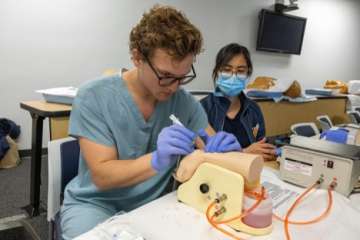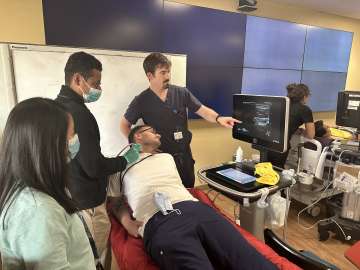Certificate Programs
Hospital Medicine Certificate Program
We offer a Hospital Medicine Certificate Program (HMCP) for residents interested in hospital medicine with experiences and teaching that will better prepare them for independent practice and to help them make informed career decisions. Residents may apply during their PGY-2 year. As this is a certificate program, residents may concurrently participate in a pathway to gain additional novel experiences. The HMCP is also open to residents who are undecided about careers in hospital medicine or who may not be planning to pursue careers in hospital medicine, but would like additional experiences that are offered.

Curricular Overview
- Mentorship: Residents are assigned a hospital medicine mentor to help develop early career goals, develop their curriculum vitae, and navigate the job search.
- Longitudinal Scholarly Project (optional): Residents have the option to complete the Hybrid QI and Lean Certification Curriculum in which they will learn to design and implement QI projects. This hybrid curriculum involves both asynchronous online modules with synchronous in-person or Zoom sessions. Residents are encouraged to present their work at conferences such as Society of Hospital Medicine or American College of Physicians and publish in academic journals.
- Enrichment and Didactics: Residents participate in monthly didactics during their PGY-3 year on high-yield topics in hospital medicine. Recent examples:
- "Billing 101"
- "Making the Most of Your First Job"
- "Respiratory Therapy and Different Modes of Oxygen Delivery"
- Hospital Medicine Elective: Residents participate in hospital medicine elective during their PGY-3 year. This includes clinical experiences rotating with various specialties, including: day triage officer, wound care team, respiratory therapy, PM&R, diabetes educator, toxicology, case management, and procedures with interventional radiology. The elective also includes a field day at a skilled nursing facility to better understand transitions of care.
Point of Care Ultrasound (POCUS) Certification

Point-of-care ultrasound has emerged as an essential diagnostic and procedural tool in modern medicine. Evidence demonstrates that POCUS improves diagnostic accuracy, reduces time to diagnosis, decreases procedural complications, enhances patient satisfaction and shared decision-making, and lowers healthcare costs. The UCLA Internal Medicine Point-of-Care Ultrasound Training Program was designed to equip residents with ultrasound skills they can confidently apply throughout their careers—whether in primary care, hospitalist medicine, or subspecialty fellowship. Our comprehensive three-year curriculum advances residents' ultrasound proficiency through longitudinal, multimodal training. The program is open to all UCLA internal medicine residents—including categorical, primary care, and medicine-pediatrics tracks—and participation is fully compatible with any Internal Medicine Pathway.
Curricular Overview
- Core Didactic Sessions: Monthly two-hour sessions led by expert faculty, featuring hands-on practice with peers and ultrasound simulation trainers.
- Online Learning Modules: Self-paced access to comprehensive POCUS educational content for flexible learning.
- Ultrasound Portfolio: Develop a curated collection of images across cardiac, pulmonary, volume assessment, abdominal, renal, and DVT applications, with personalized faculty feedback on your scans.
- Scholarly Project: Engage in academic development through case presentations for our ultrasound website, peer teaching, quality improvement initiatives, medical education projects, or clinical research.
- Interactive Learning Platform: Access our dynamic ultrasound website featuring teaching cases, highlighted articles, featured scans, pathology reviews, and curated educational resources.